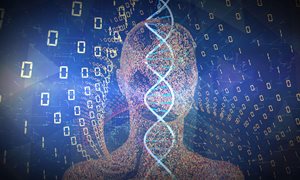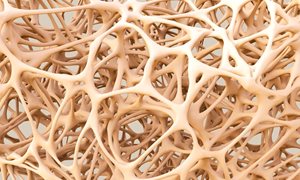
For the first time researchers from Hebrew University of Jerusalem, Radboudumc, Maastricht UMC+ and international colleagues have gained insight into the "hidden genetic defects" of the general European population. This is important because these defects, if inherited from both father and mother, can lead to all kinds of illnesses in their children. Research in the Dutch and Estonian population shows that every person has two to four such hidden genetic defects. In 1 in 100 couples, this leads to a situation with an increased risk of a genetic disease for future children. In the case of consanguinity, even 20 percent of the couples appear to be at high risk. This research is published in The American Journal of Human Genetics and Genetics in Medicine.
The genes of a every person are half maternal, half paternal. Therefor you have two copies of each gene. Sometimes one of those two copies is defective, without making you sick because the other gene still functions properly. In this case we call it a ‘hidden genetic defect’ (in scientific terms: an autosomal recessive gene). Such a hidden genetic defect can cause problems if a child inherits the same hidden defect, the same mutated gene, from both father and mother. Both parents are healthy and have never suffered from the hidden genetic defect. But when these two hidden genetic defects (maternal en paternal) come together in the child, the disease manifests itself.
Hidden defects in sight
How often such hidden genetic defects occur in the general population has been unclear. By screening all the genes of nearly 6,500 people in the Dutch and Estonian population researchers from Radboudumc and Maastricht UMC+ have now obtained insight into how often such hidden defects that can lead to disease are present in a single individual. Christian Gilissen, researcher at Radboudumc: “Every human being appears to have on average 2 to 4 such hidden genetic defects. Therefore the chance that a European couple is at risk of having a sick child due to two such defects is about 1 percent. The risk increases sharply in consanguineous couples. In a relationship of cousins, about sixteen percent of the couples are at high risk, with a particularly increased risks for skeletal disorders or intellectual disabilities.”
Higher risk with consanguinity
In addition to this research, published in The American Journal of Human Genetics, research was also conducted in the hospital's clinical practice coordinated by Maastricht UMC+, together with Radboudumc and Amsterdam UMC. This study, published in Genetics in Medicine, addresses the question of risk determination of hidden genetic defects in cousin relationships prior to a desired pregnancy. Clinical Molecular Geneticist Aimee Paulussen of Maastricht UMC+: “We mapped the risk in 100 consanguineous couples. About 20 percent of these couples were found to have an increased risk of serious disorders in their offspring through these hidden genetic defects. These results from clinical practice confirm the data already found in the population study mentioned above.”
Valuable testing
Professor Han Brunner, head of the Department of Clinical Genetics Maastricht as well as the Department of Genetics Nijmegen, is involved in both studies. He sees them as a clear incentive to make genetic testing available to couples with a possible increased risk because of such hidden genetic defects: “Certainly for these couples, this information can help them to make an informed decision when starting a family. They can consider pre-implantation diagnostics and IVF to allow selection of embryos without these defects.”
-
*Paper published in The American Journal of Human Genetics: The landscape of autosomal-recessive pathogenic variants in European populations reveals phenotype-specific effects - Hila Fridman, Helger G. Yntema, Reedik Mägi, Reidar Andreson, Andres Metspalu, Massimo Mezzavila, Chris Tyler-Smith, Yali Xue, Shai Carmi, Ephrat Levy-Lahad, Christian Gilissen, Han G. Brunner
*Paper published in Genetics in Medicine: Diagnostic exome-based preconception carrier testing in consanguineous couples: results from the first 100 couples in clinical practice - Suzanne C. E. H. Sallevelt, Alexander P. A. Stegmann, Bart de Koning, Crool Velter, Anja Steyls, Melanie van Esch, Phillis Lakeman, Helger Yntema, Masoud Zamani Esteki, Christine E. M. de Die-Smulders, Christian Gilissen, Arthur van den Wijngaard, Han G. Brunner, Aimée D. C. Paulussen
-
Want to know more about these subjects? Click on the buttons below for more news.
Related news items

Improved AI will boost cancer research and cancer care Geert Litjens receives ERC Starting Grant
13 January 2022 Geert Litjens from Radboud university medical center has received a European Research Council (ERC) Starting Grant. read more
Understanding fluctuation variation in cognitive abilities may provide insight into lifelong learning Rogier Kievit recieves ERC Starting Grant
13 January 2022 Rogier Kievit from Radboud university medical center has received a European Research Council (ERC) Starting Grant. read more
Vici grant for Michiel Vermeulen Reading the epitranscriptome
15 April 2021Michiel Vermeulen, theme Cancer development and immune defense, has been awarded a Vici grant from the Netherlands Organisation for Scientific Research (NWO), one of the largest personal scientific awards in the Netherlands.
read more
Researchers grow most lifelike bone organoid to date Greatly increasing our understanding of bone formation and bone diseases
9 March 2021 Researchers from Radboudumc and Eindhoven University of Technology have interwoven various bone cells into an 'organoid' that can independently make new, hard bone tissue. It’s the most complete 3D model of bone formation to date. Peaked your interest? Read more! read more
Does the COVID-19 cytokine storm exist? Research may have an impact on the chances of success of a specific treatment
4 September 2020 Following the measurement of several important cytokines in patients with COVID-19 and various other severe diseases, researchers at Radboud university medical center now show that COVID-19 is not characterized by a cytokine storm. read more
